Free Press Unlimited Executive Director Ruth Kronenburg’s visit was a powerful signal of international solidarity with Ukrainian journalists working under fire.
One of the most influential figures in the field of freedom of expression in the world, Executive Director of the Dutch organization Free Press Unlimited Ruth Kronenburg has visited Ukraine. Her three-day visit to Kyiv was an important demonstration of international solidarity with Ukrainian journalists and confirmation that the fight for an independent press in times of war requires global support.
Meetings with those who did not break
Ruth Kronenburg’s visit program began on August 5 with a visit to the main office of the National Union of Journalists of Ukraine (NUJU). At a meeting with NUJU President Sergiy Tomilenko and the Union’s First Secretary Lina Kushch, Ms. Kronenburg presented the NUJU Journalists’ Solidarity Center (JSC) with a Special Certificate from the international organization, Free Press Unlimited, with the eloquent inscription: “A distinction for courageous journalists who bear the truth, even when it hurts.”
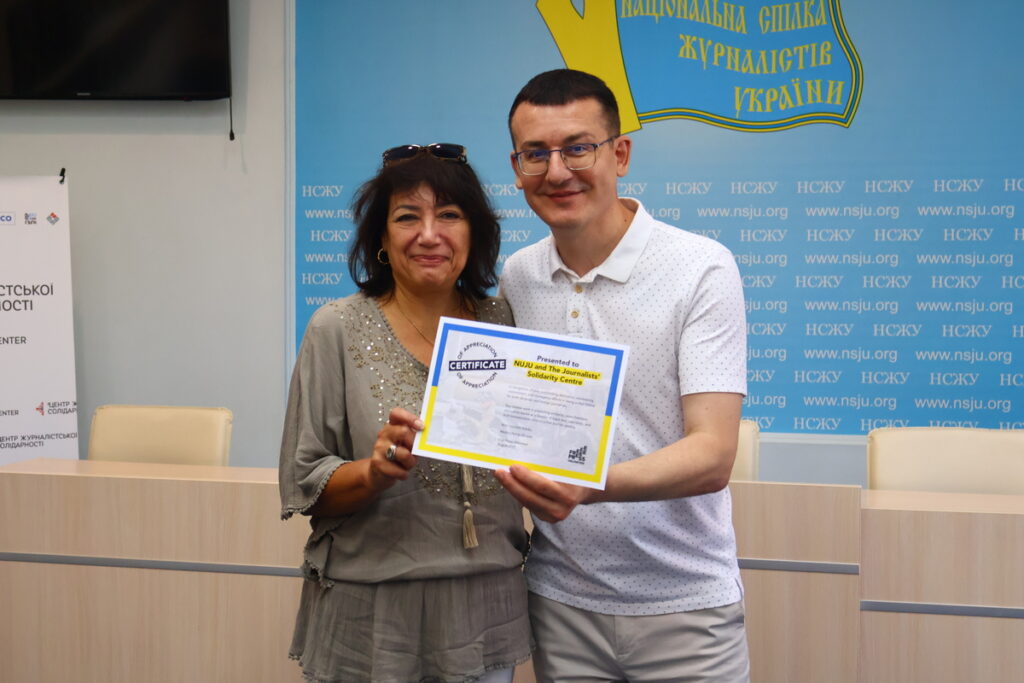
The meeting with regional journalists was particularly emotional. At it, the heads of local publications from the Kharkiv and Chernihiv Regions spoke about the difficult situation of front-line newspapers. These publications often become practically the only source of information for communities where there is no communication and even light, but despite all the challenges and risks, they continue to work.
One of the highlights of the program was an online meeting with Vasyl Myroshnyk, the editor-in-chief of the Zoria–Visnyk Bohodukhivshchyny newspaper, which is published in the Kharkiv Region. Risking his own life, he delivers the newspaper to villages located right next to the russian border.
“It is important when a journalist comes to a place where ordinary people often lack attention… Simple attention. I go to people, wait for them, they talk about themselves, I prepare materials, and this is very important for people,” said Vasyl Myroshnyk.
The editor told touching stories about the survival of the newspaper and journalists, who the russian invaders hunt with drones (unfortunately, Vasyl himself once also had to escape one of such hunts), artillery, from airplanes using cables…
“War dulls only the feeling of fear, and all other feelings – they simply intensify. This is how we live; we survive. But we will definitely win!” he emphasized.
An important part of the program was a visit to the newsroom of the online publication OBOZ.UA, whose office was damaged by the russian attack on March 23, 2025. Ruth Kronenburg was interested in how the team works under shelling and in conditions of blackouts.
“We work around the clock. During the war, we saved the entire team – and this is our most important achievement. We adapted to blackouts; we have a generator,” said the editor-in-chief of OBOZ.UA, Lesia Hasych.
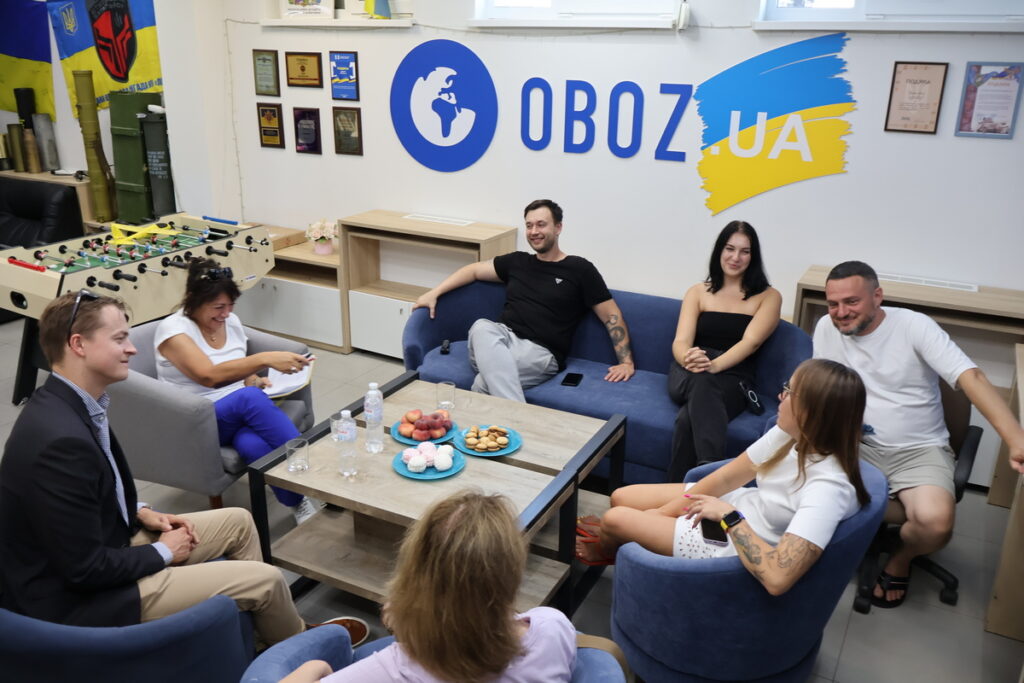
The Executive Director of Free Press Unlimited also learned about the problems in cooperation with international social networks, which often perceive news about the russian-Ukrainian war as sensitive content, which creates significant difficulties in the work of Ukrainian media.
A separate day of the program was devoted to a meeting with journalists who were forced to leave the occupied territories. Participants include Yevheniya Virlych from Kherson, who hid during the occupation at the beginning of the full-scale war and now lives in Kyiv, where a russian drone recently hit her apartment; Olena Vanina, also from Kherson; Lidiya Tarash from Volnovakha near Mariupol; and Olena Kalaitan, who fled besieged Mariupol in 2022.
Their stories became vivid evidence of how journalists in Ukraine continue to work despite the loss of their homes, threats to their lives, and constant stress.
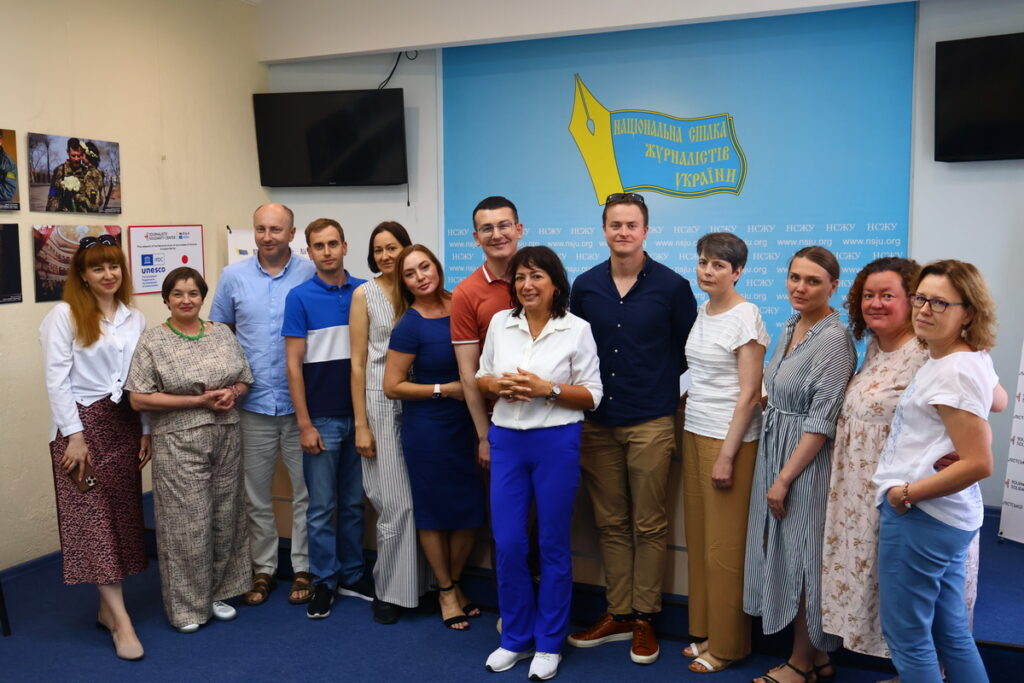
Stories of resilience from Chernihiv Region
No less poignant was the story of Svitlana Tomash, the editor-in-chief of the Visnyk Horodnianshchyny newspaper from the Chernihiv Region. She lives and works in a unique community that borders two countries at once: russia and Belarus. At the beginning of the full-scale invasion, the community was one of the first to be temporarily occupied.
“We had no communication. We were completely isolated from the rest of the world. The community survived only on what it had,” recalls Svitlana.
After de-occupation, when mail carriers delivered the pre-war February issue of the newspaper to people, “people cried and rejoiced, saying, ‘ This is our newspaper!”
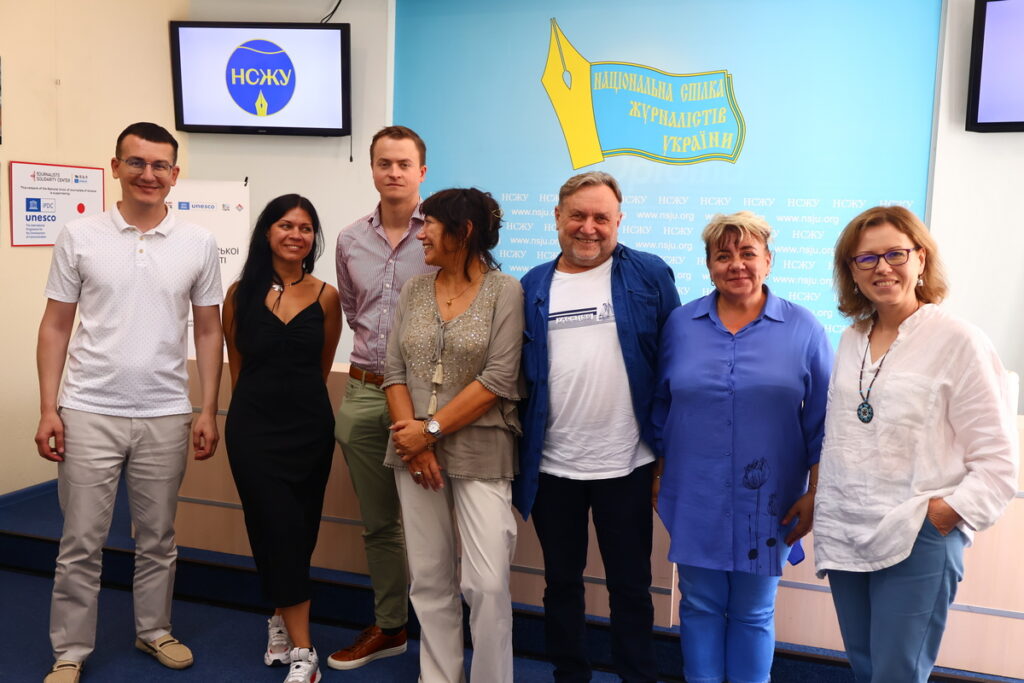
Svitlana Tomash presented Ms. Kronenburg with a bouquet of immortelle flowers, noting that they are as resilient as the Ukrainian people. She also invited the guest to visit their community, but warned her not to wear bulletproof vests, as drones track such travelers.
Representatives of the Chernihiv newspaper, Visnyk Ch, shared a unique achievement –they managed to reach 22,000 subscriptions, which makes them the most circulated print publication in Ukraine.
“We calculated that the average household in our region is more than three people; that is, we have 65,000 real readers. Therefore, one journalist provides information to more than 10,000 people,” said the editor-in-chief Serhii Narodenko.
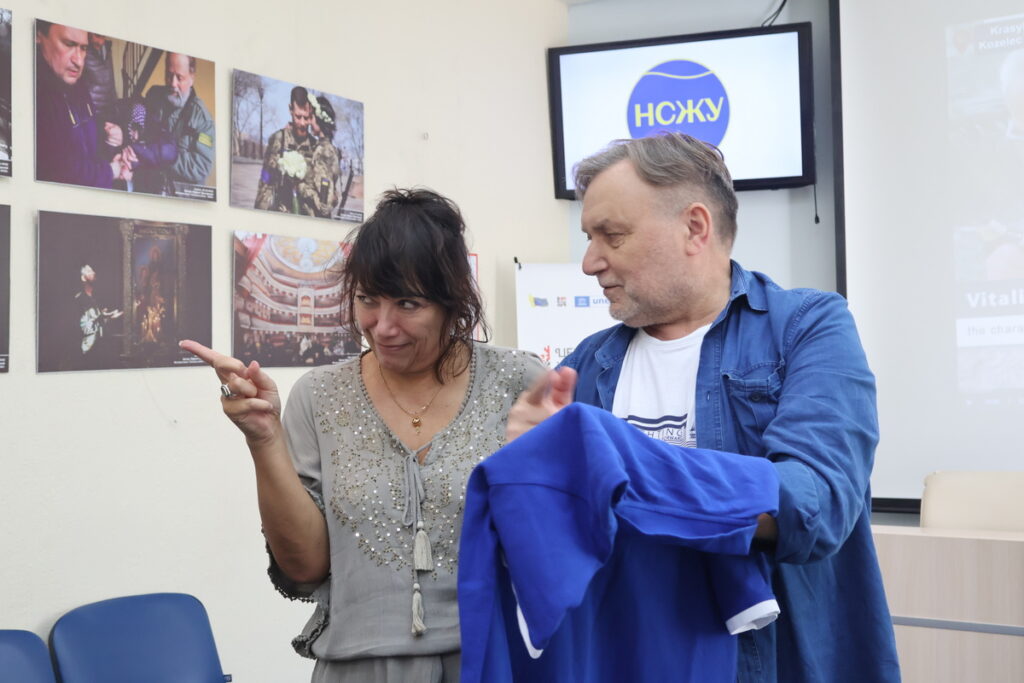
International support
The visit program also included meetings with the Ambassador of the Netherlands, Alle Dorhout, the Chairman of the Parliamentary Committee on Freedom of Speech, Yaroslav Yurchyshyn, and the representative of the Ministry of Culture, Hanna Krasnostup.
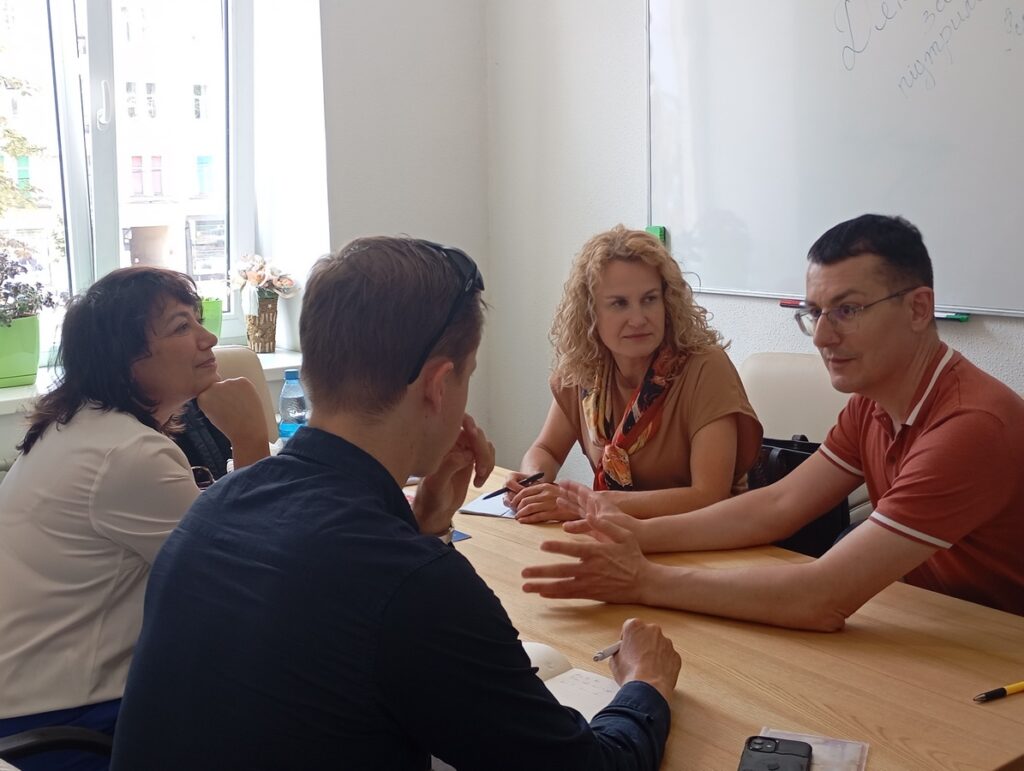
Ruth Kronenburg‘s visit demonstrated not only the resilience of Ukrainian journalists but also the importance of international solidarity in protecting freedom of speech. The Executive Director of Free Press Unlimited promised to share the stories she heard with the Dutch Ambassador for additional support and expressed hope for future visits to the regions with “good news.”
“In our estimation, Free Press Unlimited is a leader in supporting journalists in need in Ukraine,” says Sergiy Tomilenko, the President of the NUJU. “This organization has proven its reliability with real-life cases. From the first emergency aid in February 2022 to large-scale media development programs, Free Press Unlimited is always by the side of Ukrainian journalists. The FPU is able to respond quickly to urgent needs, but at the same time sees further – it understands how our media space should develop. It is such partners who help Ukrainian journalism not only to keep up the fight, but also to grow even during the war.”

“The project exceeded all expectations!”
The cooperation between the NUJU and Free Press Unlimited began long before the full-scale war, but it was the russian invasion on February 24, 2022, that became the catalyst for deepening and expanding the partnership. From the first days of the war, FPU showed its readiness to provide comprehensive support to Ukrainian journalists working in extreme conditions.
The first steps of this cooperation were extremely specific and targeted. From the first days of the russian full-scale invasion in 2022, Free Press Unlimited opened a large-scale program of emergency support for Ukrainian journalists in need. In particular, at the request of the NUJU, in the spring of 2022, it provided financial assistance to more than 150 journalists from Mariupol, Kharkiv, Kherson, Chernihiv, Kyiv, Zaporizhzhia, and other regions. In addition, thanks to the help of Free Press Unlimited, the NUJU managed to purchase 20 laptops for Ukrainian journalists who found themselves in difficult situations. This support became vital for media workers who found themselves in the epicenter of war events.
One of the most ambitious and successful joint projects of the NUJU and Free Press Unlimited was the project to support the Frontline Press, Close to Zero [Blyzko do Nulia]. This project was designed to research and support the resilience of local media in front-line and de-occupied regions of Ukraine.
The initiative included not only financial support, but also a comprehensive study of the challenges faced by newspaper newsrooms in the most dangerous regions of the country. Based on a series of in-depth interviews with editors, an analytical report was prepared, which became an important document for understanding the needs of regional media in wartime conditions.
As an experienced journalist and media manager, Oleksandr Kharchenko assessed the project results, “Close to Zero project exceeded all expectations.” This assessment indicates the high effectiveness of cooperation between the NUJU and FPU in supporting regional media.

The partnership between the NUJU and Free Press Unlimited was not limited to financial assistance. The organizations worked together on the technical modernization of the work of front-line newsrooms. In particular, thanks to their cooperation, local front-line newsrooms were provided with funds to purchase smartphones to develop mobile journalism. This initiative became especially important in conditions when traditional methods of collecting and transmitting information became complicated due to military operations. Mobile journalism allowed newsrooms to promptly cover events without risking the lives of journalists by using complex equipment in dangerous areas.
Among the most recent joint projects is the creation of a unique English-language prototype newspaper, Frontline Press, which the NUJU presented in May this year during UNESCO events in Brussels. The publication tells the world about the heroic work of Ukrainian newsrooms from front-line regions.
“In Ukraine, we have witnessed an extraordinary phenomenon – local newspapers continue to be published despite constant danger,” says the organization’s head, Ruth Kronenburg.
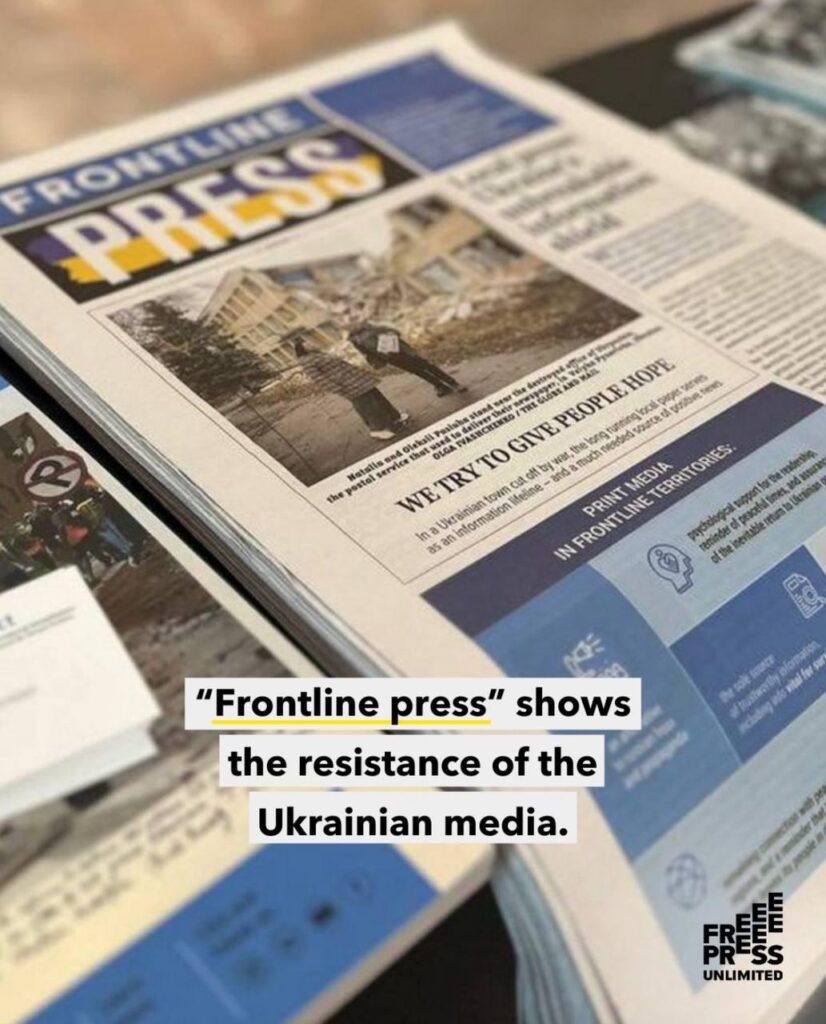
“We have supported journalists for three years since the beginning of the full-scale invasion”
It is worth mentioning separately the educational part of the cooperation. The NUJU, together with Free Press Unlimited, adapted special digital security courses for Ukrainian journalists on the Totem platform. The list included the courses ‘Protecting Your Sources’, ‘Documenting Human Rights Violations’, ‘Field Research’, and ‘Cabinet Research’.
These courses became available not only to journalists but also to human rights defenders, which significantly expanded the circle of people who could use this knowledge. And in wartime, digital security issues have become critically important – a mistake could cost not only information, but also life. Ukrainian journalists and human rights defenders have access to universal courses, Ukrainianized thanks to the cooperation of the NUJU and Free Press Unlimited.
Free Press Unlimited, together with the NUJU, worked not only to directly assist Ukrainian journalists but also to raise awareness about their work. They created an English-language digest, Frontline Press, which told the stories of journalists from front-line regions and their work during the war.
This project was of enormous strategic importance – it allowed us to bring the real stories of Ukrainian media workers to an international audience, to show their professionalism and dedication to the cause even in the most terrible conditions.

The partnership also reached the highest international level. Ruth Kronenburg took part in the UN discussion “Journalists under fire,” which was organized with the active support of the NUJU. Such cooperation helped to draw the attention of the world community to the problems of Ukrainian journalists.
In 2024, this fruitful cooperation received official recognition. During meetings in the Netherlands, Sergiy Tomilenko presented Free Press Unlimited with a special award for media support and assistance to Ukraine. This award became a symbol of the deep gratitude of the Ukrainian journalistic community for its consistent support during the most difficult period in the history of independent Ukraine.

Free Press Unlimited regularly supported the NUJU initiatives at the international level, signing important documents. In particular, the organization joined the statement of international organizations “We support journalists 3 years after the start of the full-scale invasion,” as well as the appeal of 44 media organizations, which condemned the fact that the issue of media restoration was completely ignored at the conference on the reconstruction of Ukraine in Rome.
Such collective work was of great importance for the issue of supporting Ukrainian media to get on the international agenda, and for the media sphere to be included in the strategies for the post-war reconstruction of the country.
The evolution of cooperation between the NUJU and Free Press Unlimited shows how emergency aid in the first days of the war grew into a systemic strategic partnership. If at first the main thing was to help journalists who found themselves in the combat zone with money, then later the cooperation expanded to comprehensive programs for media development, educational initiatives, and international advocacy.
This approach shows that both organizations understand: supporting Ukrainian media requires not only quick solutions here and now, but also a strategic vision of what the country’s media space should be like in the future.

Not only material assistance, but also professional development of media professionals
An important part of Free Press Unlimited‘s work in Ukraine has been the Media Lifeline Ukraine initiative – a coalition created to protect journalists and ensure access to reliable information in and around Ukraine. This coalition was presented at a crisis meeting in Amsterdam on March 4, 2022. Journalists, media experts, and interested organizations discussed long-term support for independent media and journalists in Ukraine. The NUJU has become an important partner in this initiative, which has allowed to coordinate the efforts of the international community in supporting Ukrainian media.
As part of cooperation with international partners, including Free Press Unlimited, the NUJU has developed a network of Journalists’ Solidarity Centers (JSC). These centers have become important points of support for journalists on the ground, providing not only material assistance but also professional development of young media professionals. The JSCs show how international support can be effectively transformed into local initiatives that directly affect the development of regional journalism.
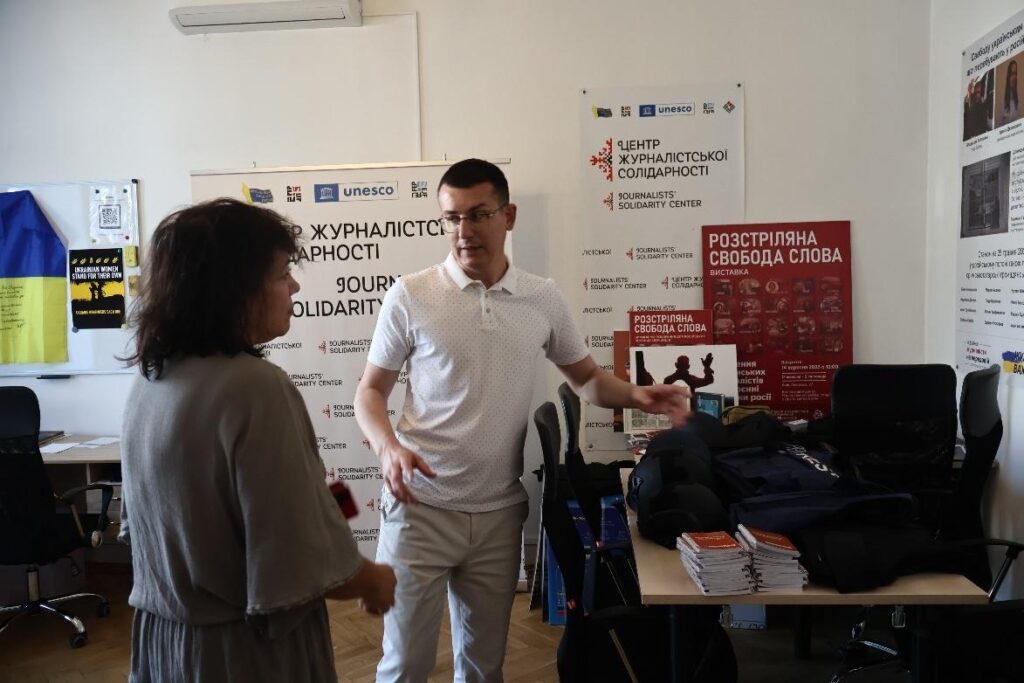
The collaboration between the NUJU and Free Press Unlimited was not a simple matter. Wartime conditions required constant changes in programs and approaches. But both organizations showed flexibility and readiness to adapt their initiatives to the real needs of Ukrainian journalists.
It was especially difficult to ensure the safety of program participants in front-line regions, coordinate work in conditions of poor communication and constant threats, and adapt international standards to the specific conditions of work in a zone of active hostilities.
The partnership between the NUJU and Free Press Unlimited has great potential for further development. In the conditions of a protracted war, the need for support for Ukrainian media is only growing, and the experience of successful cooperation creates a solid foundation for new initiatives. Promising areas include expanding educational programs, developing the technical capabilities of regional media, deepening international advocacy, and preparing for the post-war restoration of Ukraine’s media space.
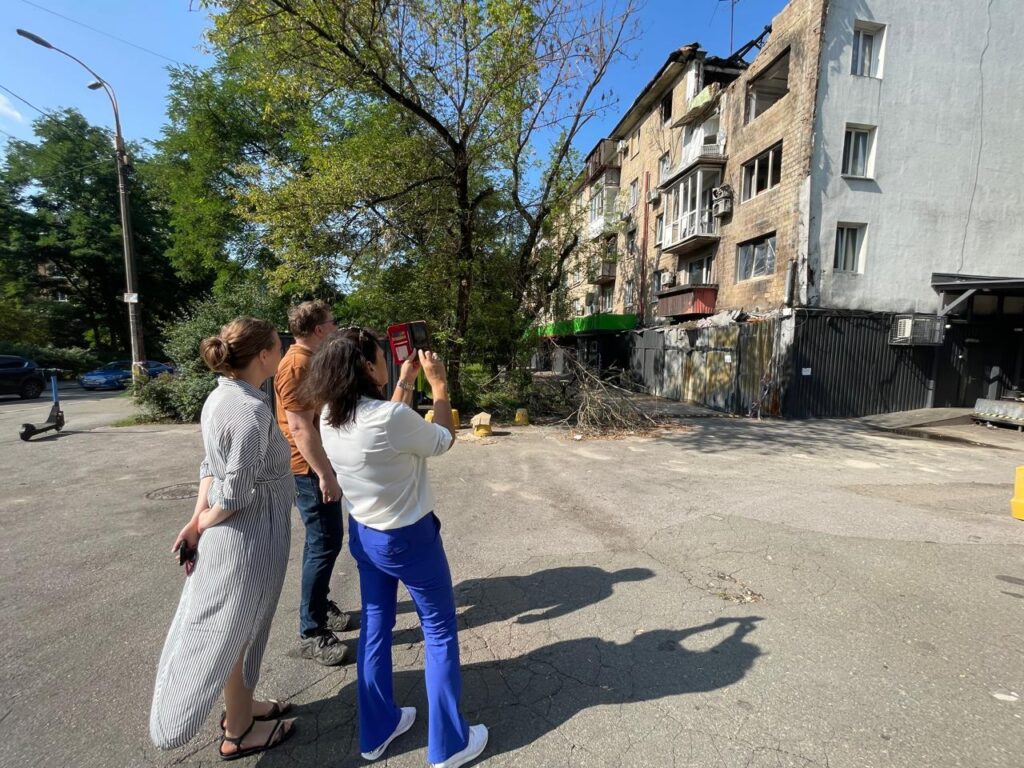
Ruth Kronenburg‘s visit to Ukraine was an important reminder that the fight for independent journalism in Ukraine is not only an internal matter of the country, but also part of the global struggle for freedom of speech and democratic values. The stories of Ukrainian journalists who continue to work under fire, under occupation, and on the front lines need to be heard by the whole world.
Today, more than ever, we need the voices of freedom to speak together – from Kyiv to Amsterdam, from Kharkiv to The Hague – supporting those who bear the truth, even when it hurts.
NUJU Information Service

 THE NATIONAL UNION OF
JOURNALISTS OF UKRAINE
THE NATIONAL UNION OF
JOURNALISTS OF UKRAINE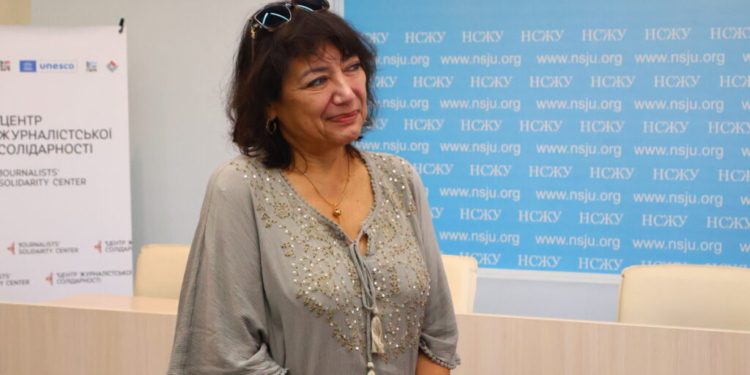
















Discussion about this post